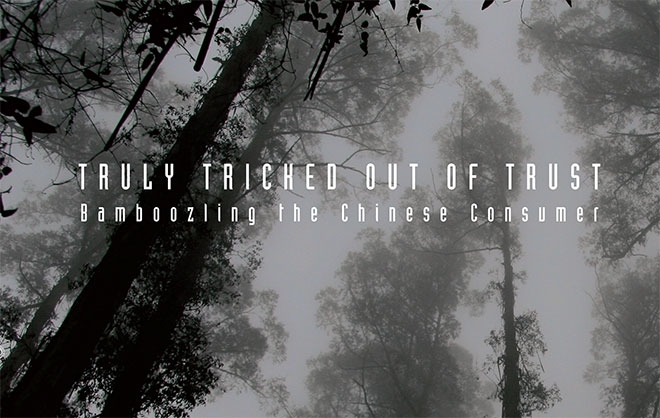We at The Nanjinger often spend a vast amount of time contemplating, discussing and analising Chinese sociology. Laid out on the table this month is societal reflection and what that means for China.
So often do we as humans (borders withdrawn) enjoy watching, laughing and poking fun at the misfortunes and foolishness of others; very rarely to we take a deep breath and shine the light on ourselves. After much deliberation, one of the main issues in China’s modern era that stood out the most is Habitual Distrust.
Chinese habitual distrust is perceived as a rapidly growing social problem, not only among consumers, but greater society as a whole. As humans, a healthy amount of distrust is essential to survival. We would not dare pet a snake; we have no evidence of trust that it would not bite us. Instinctual distrust is needed, and it seems fair to say that in our modern society, riddled as it is with the all the darkness of Dante’s inferno, we may all not only need instincts to protect ourselves and our loved ones, but we need learn caution as well.
As you are most likely aware, over the past 30 years, the Chinese consumer has suffered time and time again from the selling of “fake” goods. Used in this sense, it generally describes an item that is different in some way to the item the consumer thought they were buying. This can range from harmless “fakes”, as unwillingly purchasing a pair of New Barlun’s instead of New Balance, or strolling around bewildered in one of China’s fake English or German “towns”, to more sinister and frankly dangerous fakes, such as the practice of faking medicine or food.
In May 2017, a video on Weibo went viral which showed a group of people manufacturing fake Hennessey Whisky from their backyard; the very next day another video went viral in which Budweiser cans are taken straight from a bin, dipped into fake beer and the lid of the can melted back on, to be later packaged and sent to night clubs and KTVs all over Guangzhou. These are just the latest cases in an onslaught of fake foods, medicines, cars, electronics and even people.
It is therefore no wonder the word “Huyou” (忽悠), meaning “bamboozle”, or “to trick or con”, is used to describe this current state of hyper distrust. Bamboozlement at its all time high came with the not too far back baby milk scandal of 2008. A lack of food safety regulations saw the tainting of baby milk powder that had been adulterated with melamine; six babies died and 54,000 were hospitalized with kidney stones and kidney damage, while a further 12 babies died from malnutrition due to watered down milk. It was after this that parents seriously started looking abroad for food that they could trust.
Over the past 9 years scandals upon scandals such as this have helped give a final push for China’s middle class to start seriously buying imported products. We have now a flourishing industry of overseas purchasing agents, big foreign-name supermarkets and serious brand awareness, all built on the backbone of increasing habitual distrust from a nation’s affluenct middle class, demanding (and paying for) improved health.
Take a wander through one of the bigger Suguo supermarkets in your area and you will see standing in rank with other trusted Chinese trademarks, the Tesco brand. Big, bold and beautiful, it stands out among the rest and screams, “I’m foreign, cheap and trustworthy; choose me”. And we do. British giant Tesco has taken their place among Chinese brands, cutting the need for direct overseas purchasing or online uncertainty. A great example of consumer trust in China is Jiangsu’s, Vanguard owned, Suguo supermarket. Suguo is so well known and trusted throughout Jiangsu that the foothold it has over the region only leaves enough space for the mighty Tesco to join the queue to take up a place on the shelves of its supermarkets.

Just putting some English on a product no longer cuts it with China’s ever-sophisticated consumer, which is why retail giants such as Vanguard have given them what they want; trust in a well-known brand at affordable prices. Following suit is online marketing, consistently providing solutions to problems of distrust and dissatisfaction. As an example, Alipay has helped bridge the gap of distrust between merchants and buyers by introducing third party slow release payment options. Peer-to-peer testimonials are one of the best tools for sellers these days, with word of mouth coming in as the second best method of gaining trust. A study by Brand Karma showed that 42 percent of the worlds travel reviews are written by Chinese people, keen to share their experiences and inform fellow Chinese travellers of the dos and don’ts of travel.
While the consumer industry is getting its head around how to gain the trust of the Chinese people, China’s civil service is lagging behind. A May 2017 survey conducted by The Nanjinger revealed 80 percent of people did not know whether they trusted the police and a further 70 percent of those surveyed said they would only trust a Chinese doctor with their life “depending on the doctor’s reputation”. Furthermore, the study exposed that 80 percent of people only “sometimes” trust government statistics, while 50 percent trust their close friends over family members.
Whether vast swathes of their reality, due to the bamboozlement of facts, figures or experience, are what fuel their distrust, or whether it is a deeply ingrained instinctual habit, the fact remains the same; gaining the true, unfiltered and genuine trust of a Chinese person and keeping it is complex and arduous.









